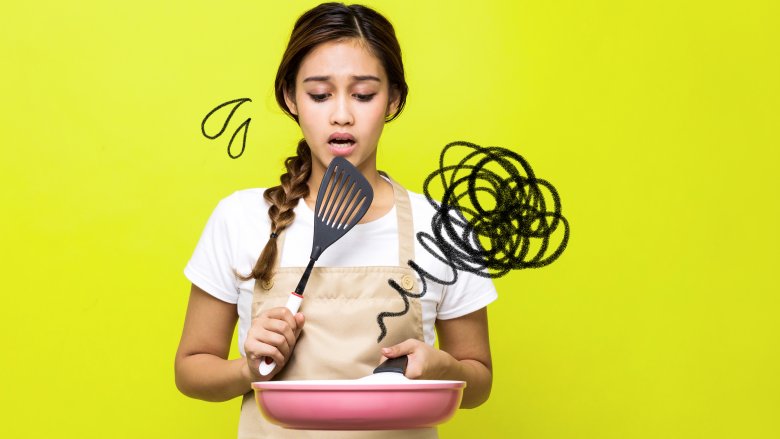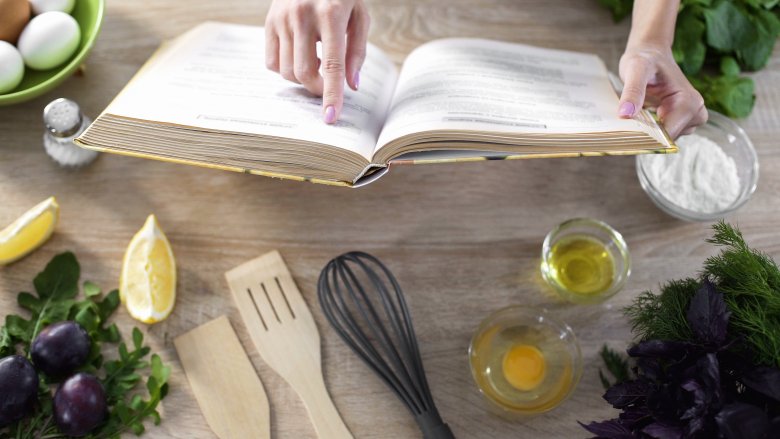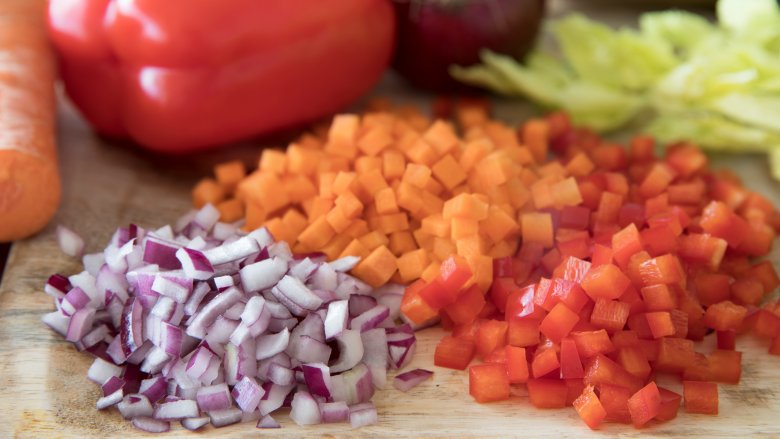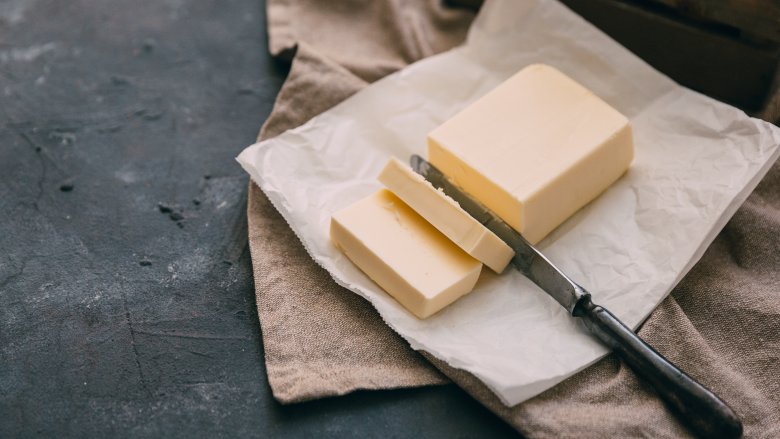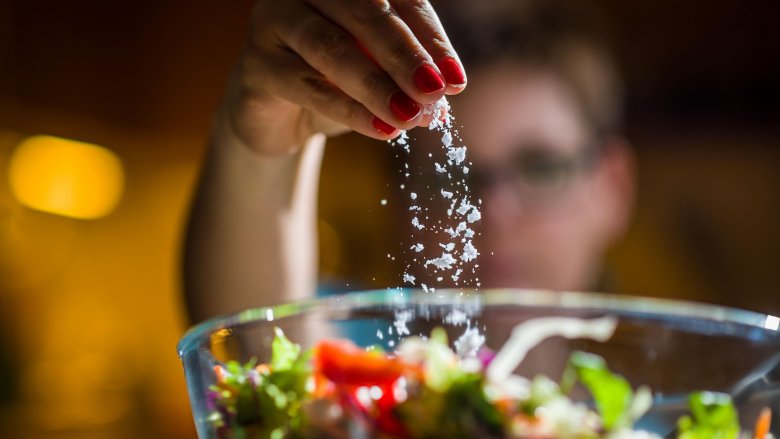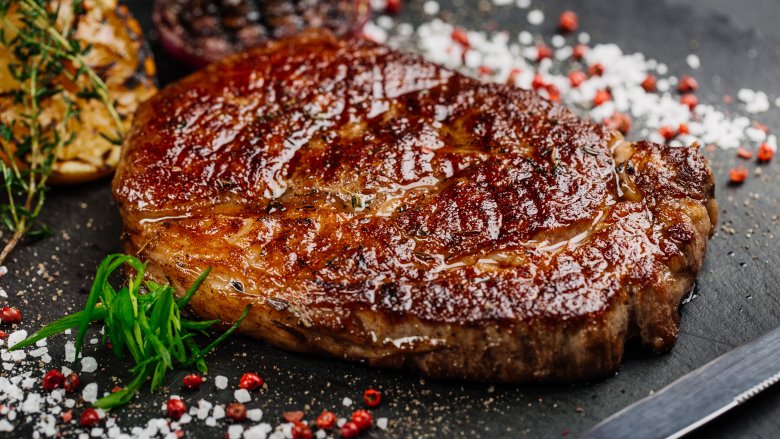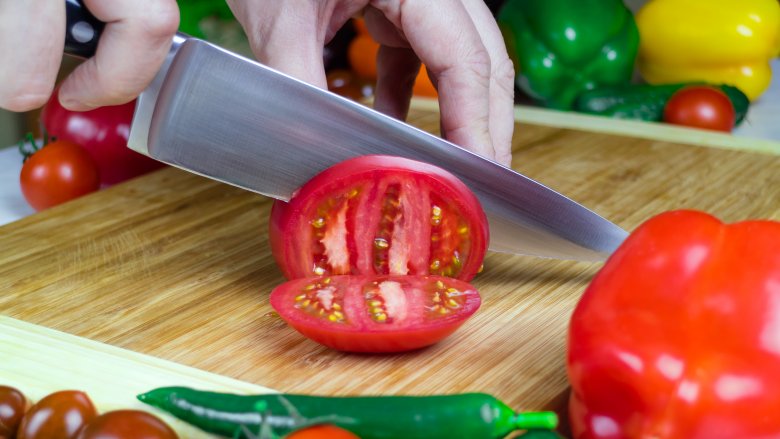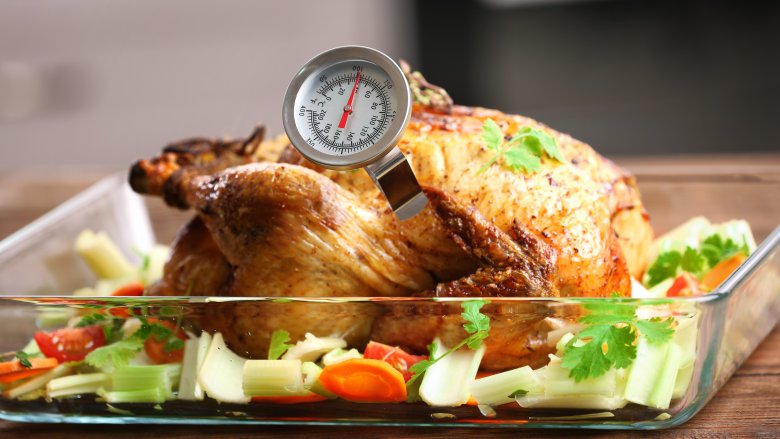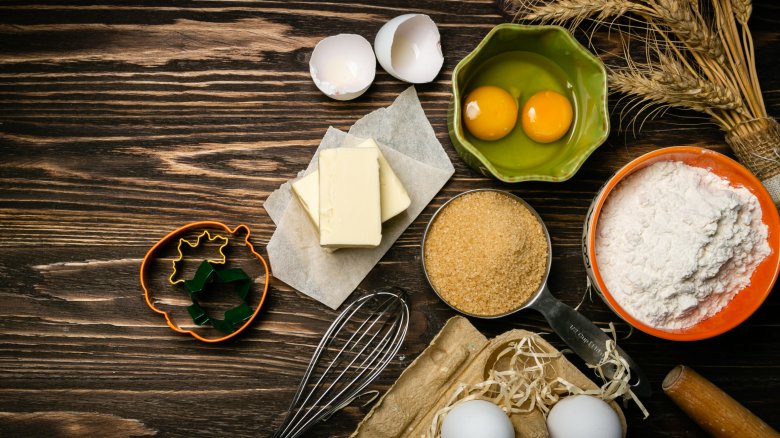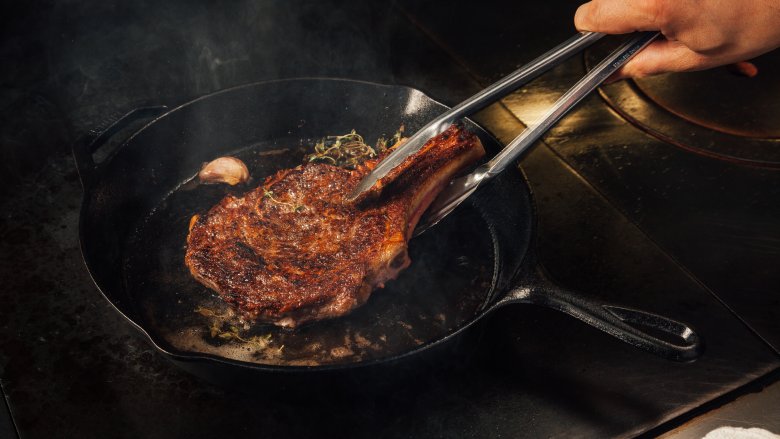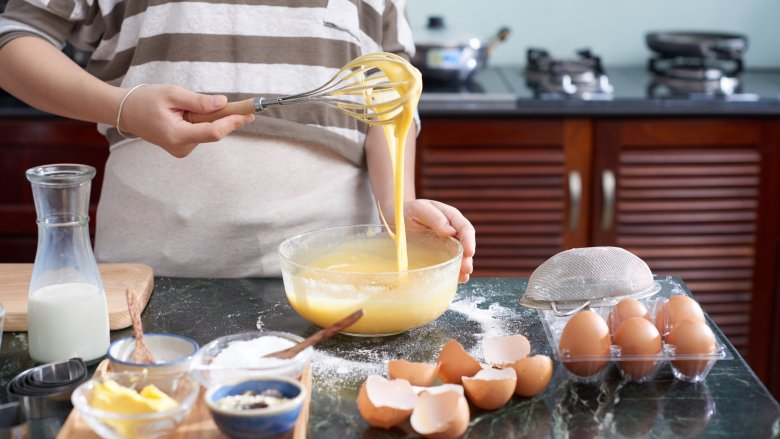Noob Mistakes You're Probably Making When You Cook At Home
Whether you start when you're 14 or 40, learning to cook can be a daunting process. There's a whole lot to take in, and, as with any new undertaking, there's also a whole lot that can go wrong. Thanks to the Food Network, it's easy to believe that simply donning an apron and wielding a sharp knife magically turns you into Bobby Flay, but unfortunately, that's not the case.
Now, don't get us wrong — cooking isn't rocket science, but there are basic skills and techniques you need to know so that your first attempts in the kitchen aren't disastrous. By following the advice of these professional chefs and avid home cooks, you'll be off to a much smoother start. From the importance of salt to the reason you shouldn't crowd a pan, here are the biggest cooking mistakes newbies are probably making in the kitchen. Master these, and you'll be that much closer to becoming Bobby Flay.
You don't read the recipe
First things first: No matter how long you've been cooking, it is essential that you read a recipe in its entirety. You don't have to take our word for it — according to Lisa Siva, an editor an Panna Cooking, famous chef David Lebovitz agrees.
Siva writes on Quora that she posed the question, "From a professional chef's viewpoint, what are the main mistakes made by amateur cooks?" to Lebovitz, who listed not reading the recipe all the way through as one of the top three biggest offenses a noob will commit in the kitchen.
One more time for those in the back: All. The. Way. Through. No scanning just the ingredient list. No skipping steps. Read it completely and thoroughly, or risk running into problems halfway through. Maybe you don't have a tool or piece of equipment you need. Maybe you don't know a term or a technique described. By doing your research before you start cooking, and by ensuring you have exactly what you need, your chances at a recipe success versus a recipe failure go way up.
You don't prep your ingredients
Now that you've read your recipe all the way through, you've got to get to work on the ingredient prep. In a Reddit thread that asked the question, "Professional Chefs of Reddit; what mistakes do us amateur cooks make, and what's the easiest way to avoid them?" plenty of chefs agreed that this is of utmost importance.
One chef explained why, saying, "MISE EN PLACE. You will hear this term in every professional kitchen. It means roughly 'things in place.' Get EVERYTHING ready before starting to cook, have all ingredients prepped, tools handy (knives, cutting boards, spoons, whisk etc.), ovens heated and pans ready to go. Work organized and orderly, this will come along with practice. It goes a long way and takes a lot of stress out of cooking."
It's true. Knowing that you will be able to quickly and easily follow the recipe, without stopping to frantically chop an onion, goes a long way in building confidence in the kitchen.
You make bad substitutions
So you've got a dish that turned out all wrong, and you just can't figure out why. Did you maybe make an ingredient substitution that you had no business making?
One Redditor describes why this is a real problem, saying, "Another mistake beginners make is injudicious substitutions. Replacing cream with 2% skim milk or olive oil for shortening, for instance. Before changing a recipe, you need to understand just what those ingredients are doing in the dish–giving structure, adding moistness, etc.–and make sure that the substitute is serving the same purpose."
Chef and food writer J. Kenji López-Alt chimed in to agree, relaying a story of ingredient substitution gone wrong. "When I worked at Cook's [Illustrated], the best 'the recipe didn't work!' report I remember is a reader who tested a recipe for chicken enchiladas we'd developed. His problem? He said 'I didn't have the ingredients for the sauce on hand, so I substituted it with some crushed tomatoes and a tablespoon of peanut butter, because a woman in my church said that's how she makes her enchiladas. It tasted terrible.'"
Bottom line is that professionals write recipes a certain way for a reason. Until you're a bit more comfortable in the kitchen, it's probably best not to make any rogue substitutions.
You don't use enough salt
The ability to properly season is one of the most common answers among chefs who are asked to name the biggest mistakes made by newbie cooks.
One chef, who answered this very question on Quora and is clearly tired of handing out the same advice over and over again, says simply, "Salt. Always the freaking salt. Not salting during cooking, not tasting as you go and adjusting seasoning that way...thinking that salt isn't really important...ugh."
Okay, so salt is of utmost importance, but why? This Redditor provides a bit more insight, explaining, "If when tasting something and thinking it is a little off or needs 'something' so you add more garlic powder, basil, cumin, spice, etc. The real answer is probably salt. Proper salting is very important and takes a little practice. Add it a little at a time as once its in, you can't take it out. Your dish doesn't have to be drowning in salt to taste good but without the right amount, almost everything will taste a little bland."
One final note on salt: These days, most recipes call for kosher salt. If you're working with table salt (which is much finer than kosher), you'll need to use half of what's called for in the recipe.
You don't let your meat rest
We get it — it's hard to resist cutting into a steak that's hot off the grill, but you'll need to exercise some patience here. As one Redditor noted, a true noob mistake is "Not resting meat before slicing it." In fact, they recommend you "just walk away."
But if you're truly a noob, you might not know what it means to "rest meat." Another helpful Redditor followed up this smart advice with some insight as to why this is so important, saying, "When your cut of meat is almost done? It's actually done. Take it off the heat... Place it on a cutting board. Put a clean dish towel over it. And let it sit there for a good 7-10 minutes before you slice into it. This way, all the juices in the steak that were being agitated by the heat return to their normal state. If you slice into a steak fresh off the stove or grill, you lose all that wonderful flavor — as well as your juicy texture — on the cutting board."
You don't treat your knives properly
A good, sharp knife is truly one of the most important tools in the kitchen, and it's essential that you treat them with care.
Although a super sharp knife might seem a bit scary, it's actually safer than a dull knife. Sound counter-intuitive? This chef explains on Quora, saying, "True, if mishandled, a sharp knife can cause serious injury. More so if using a blunt knife; since one would actually have to exert more or force to get the job done, which can cause even more serious injuries. Learn to use a sharp knife, the sharpening stone, and let the knife do the work."
According to a former Culinary Institute of America student, you can keep your knives in tip-top shape by following two simple rules: 1. "Always carefully wash and dry your knife after each usage and return it to a magnetic wall-hanging rack — NO PUTTING IT POINT DOWN IN A DISH RACK!" 2. ONLY USE YOUR KNIFE ON HARDWOOD BOARDS. These days many people think they're being good by upgrading their plastic (!) cutting boards to glass. To me, the sound of a good knife hitting a hard surface like glass makes a chalkboard squeal sound like angels singing."
You don't rely on a thermometer
When you're just starting out, meat and poultry can be two of the most intimidating things to cook. The first time you roast a whole chicken there's a good chance it will be undercooked in places, even if you followed the recommended oven temperature and cooking time. So what's the solution to raw-in-the-middle meat?
One professional chef writes on Reddit that if you're not using a meat thermometer as an amateur, you're making a big mistake. "If you don't have a good feel for how done meat should be, use a thermometer. Ignore any recipe that gives precise cooking times, because they're rarely going to be correct."
The problem with following the recipe to a T in this case is that your oven temperature might not actually be what the display says — what you think is 350 degrees might actually be more like 300, and whatever you're cooking is going to take longer as a result. Another issue is that your meat probably isn't the exact size of the one used in the recipe, and that's going to change cooking times, too. Make friends with your meat thermometer and cooking proteins will get a lot easier.
You're a careless baker
If you're dipping your newbie toe into the baking arena, this pro advises that you avoid a dessert fail by taking the following advice to heart:
"Pastry cook here, on the sweet side of things, my biggest piece of advice is to follow the recipe exactly if you don't know exactly what you're doing. Baking is basically science and if you don't calculate substitutions right, it's never going to come out right. Also make sure you have good ingredients. That box of baking soda from 5 years ago is not going to work that well anymore."
As we've already learned on the cooking side of things, ingredient substitutions are usually a bad idea, but in baking it can lead to even more disastrous results. The things you put in desserts — eggs, leaveners, and different kinds of flour — are all there in very specific amounts for good reason. Unless you want rock hard cookies or a flat cake, you're better off not making any changes.
You overcrowd the pan
Let's say you're making a big batch of beef stew. The recipe tells you to sear the cubed beef in at least two batches, but you think that's a waste of time so you just throw all of it in the pan and hope for the best. Spoiler alert: It's one of the biggest newbie mistakes you can make, and you're never going to get a good sear on your meat this way.
Why not? "Because it will reduce the temperature of the pan and also release more 'juice' essentially causing the meat to stew," explains one Redditor. Just like that, you've kissed that glorious brown crust goodbye. And even if the surface of your pan is large enough for all the meat to touch it, you still want to be careful. "It's not 'if it fits, it sears,' think of 50% of the pan as a heat reservoir. If 5 steaks fit into the pan nicely, put only 2 in," another Redditor advises.
Searing in batches might take longer, but it sure beats boiled meat.
You don't clean as you go
You're probably not going to like this, but not cleaning as you go dominates discussions about the biggest mistake noob home cooks make. Over and over you'll see recommendations like this Redditor's: "Best advice: Clean as you go. If you're done cooking and there's a giant mess, you're not done. Keep a garbage bowl nearby and dump it at the end. Better yet, you know those millions of grocery bags you have lying around? Keep one next to you while you cook and put all of your garbage in there. Wrappers, egg shells, empty cans, everything. When you're done, throw the entire bag away and you're halfway there (halfway, because all that's left is dishes)."
But nobody wants to stop what they're doing mid-cooking to clean, so what's the benefit? For one thing, it frees up counter space for you to move on to your next steps, unencumbered. And perhaps more importantly, it lessens the possibility of cross-contamination. Not giving your dinner guests food poisoning is probably reason enough to heed this warning, right?
